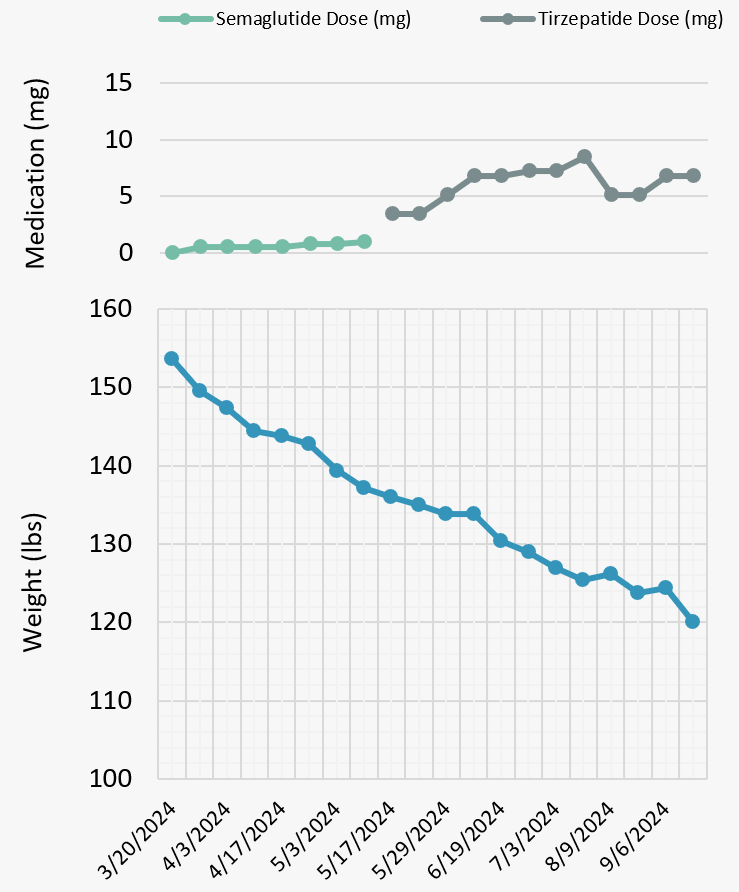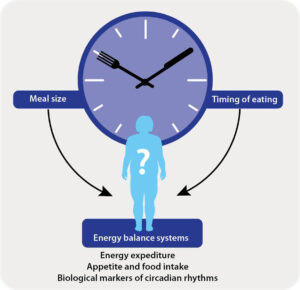Let’s discuss a common question that I get asked quite often: How long does it take to lose weight on GLP-1 receptor agonists?
This is a common concern for many people starting their weight loss journey with GLP-1 receptor agonists. While individual results can vary, it’s important to understand that sustainable weight loss takes time. Let’s break down what you can typically expect during different stages of your treatment.
Initial Weight Loss Expectations
Let’s start with what to expect in the first month.
Typically, people lose a couple of pounds in the first month. This initial weight loss is often modest and can vary from person to person. It’s important to note that this period is mainly for your body to adjust to the medication. We’re not looking for significant weight loss initially.
The goal during this initial phase is to allow your body to acclimate to the medication and establish a baseline for future progress. It’s crucial to maintain patience and consistency during this time, as the full effects of GLP-1 receptor agonists typically become more apparent in the following months. Remember, sustainable weight loss is a gradual process, and these medications are designed to support long-term changes in your eating habits and metabolism.
If you’ve lost no weight or just 1-2 pounds, don’t panic – this is normal and doesn’t necessarily indicate a lack of effectiveness. The medication is still working to regulate your appetite and metabolism during this time. What’s crucial is to focus on how you feel – are you experiencing reduced hunger or cravings? These are positive signs that the medication is taking effect, even if the scale hasn’t shown significant changes yet.
Variations in Weight Loss Patterns
It’s important to understand that weight loss patterns can vary.
Some patients may experience rapid weight loss in the first month or two. This could be due to significant side effects affecting appetite or causing nausea. However, it’s important to note that rapid weight loss isn’t always sustainable or healthy. Our goal is to achieve steady, gradual weight loss that can be maintained over time. If you’re experiencing rapid weight loss, it’s crucial to communicate this to your healthcare provider to ensure your health and safety throughout the process.
Weight loss plateaus are common and normal. You might lose weight in month 2, plateau in month 3, then lose again in month 4. Or you may experience a more cyclical pattern, with periods of weight loss followed by plateaus. This variability is completely normal and doesn’t indicate any issues with the medication’s effectiveness. What’s most important is the overall trend of weight loss over time, rather than focusing on short-term fluctuations.
On the other hand, some people may lose weight consistently month after month. This steady, gradual weight loss is often seen as the ideal scenario, as it suggests that the medication is working effectively and consistently. These patients may experience a more predictable pattern of weight loss, which can be encouraging and motivating. However, it’s important to note that even in these cases, the rate of weight loss may slow down over time as the body adjusts to its new weight.
Remember, none of these scenarios is bad – it’s just how your body adapts to the medication. The key point is to keep a close eye on all these changes and interact with me and your care team to make any adjustments as needed. This could mean adjustments to your medications. From my perspective, there is often room to make adjustments to your eating pattern and foods. This often helps people get back to a more consistent and predictable weight loss trend.
Medication Strategies
As you expect, the type of medication can influence weight loss speed and consistency:
- Semaglutide is a single-agent GLP-1 receptor agonist. It works by mimicking the effects of the GLP-1 hormone, which helps regulate blood sugar levels and appetite. Semaglutide is typically administered once weekly, making it convenient for many patients. While effective for many, some patients may require a dual-agent approach for optimal results.
- Tirzepatide is a dual-agent medication, mimicking both GLP-1 and GIP hormones. Tirzepatide is a dual-agent medication, mimicking both GLP-1 and GIP hormones. This dual action can potentially enhance its effectiveness in regulating blood sugar and promoting weight loss. The combination of GLP-1 and GIP effects may provide a more comprehensive approach to metabolic regulation, potentially leading to improved outcomes for some patients. Tirzepatide may lead to faster or more consistent weight loss
Many patients do well on single-agent therapies, which are often a good starting point for most individuals. They offer an effective way to manage weight loss while minimizing potential side effects. However, if a patient’s response to a single-agent therapy is suboptimal, your doctor may consider transitioning to a dual-agent approach like Tirzepatide. This decision is always made on a case-by-case basis, taking into account the individual’s health profile, weight loss goals, and response to initial treatment.

Long-Term Expectations
What happens if weight loss is slow or stalled after several months?
We will reassess your situation carefully to determine the best course of action. This may involve reviewing your diet and exercise habits, checking for any underlying health issues that could be impacting weight loss, and evaluating the effectiveness of your current medication regimen. We’ll also discuss any lifestyle changes or additional support you might need to enhance your weight loss efforts.
Additionally, we may consider if side effects are minimal or well-managed, to consider increasing your dosage. This approach allows your doctor to fine-tune the treatment to your individual needs and response. It’s important to note that dosage adjustments are always made under careful medical supervision to ensure your safety and optimize the benefits of the medication.
When considering a dosage increase, your doctor will closely monitor your progress and any potential side effects. This gradual approach helps you to find the right balance between effectiveness and tolerability, maximizing your chances of successful, sustainable weight loss.
Keep in mind, dosage increases are typically done gradually up to the maximum approved dose for that particular medication. For example, the maximum approved dose for Semaglutide (Wegovy) is 2.4 mg per week, while for Tirzepatide (Mounjaro), it’s 15 mg per week. Your doctor will work with you to find the optimal dose that balances efficacy and tolerability, ensuring the best possible outcomes for your weight loss journey.
In Summary
To wrap up, you can realistically expect to lose weight at the following pace:
- Initially, you might see a modest weight loss of 1-2 pounds in the first month.
- From months 2-6, a steady weight loss of 1-2 pounds per week is common for many patients.
- After 6 months, weight loss may slow to about 0.5-1 pound per week, but this can vary based on individual factors and adherence to the treatment plan.
Remember, everyone’s weight loss journey is unique. As your dedicated nutrition expert, I’m here to support you through this process, helping you navigate the challenges and celebrate the successes.
We’ll work together to tailor your approach, adjusting strategies as needed to ensure you’re making progress towards your goals. Whether it’s fine-tuning your diet, addressing any challenges with medication, or exploring new ways to stay motivated, I’m here to provide personalized guidance every step of the way. If you have any questions about your weight loss plan or long-term lifestyle strategies, don’t hesitate to reach out.















